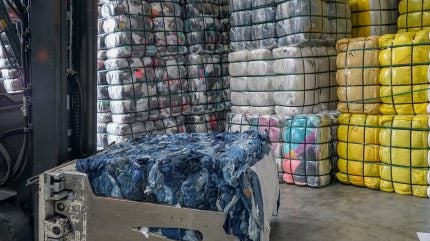
The study, conducted by Full Cycle Resource, shows second-hand clothing exports help divert textile waste from landfill and incineration in the US while generating jobs, entrepreneurship, and drives circular economy practices in the Central American nation.
Garson & Shaw CEO Lisa Jepsen said: “This report is significant because it shifts the conversation from waste to opportunity. It offers concrete evidence that global reuse systems are not only environmentally beneficial but also economically and socially valuable. It highlights the need to integrate international reuse into US waste and circular economy policy.”

Discover B2B Marketing That Performs
Combine business intelligence and editorial excellence to reach engaged professionals across 36 leading media platforms.
The US is one of the largest producers of textile waste globally, with a staggering 85% of used clothing ending up in landfills or incinerators annually.
As per the report, Guatemala imported 131 million kilograms of used clothing from the US in 2023, which represents 98% of its total used clothing imports.
The study found that nearly 90% of these garments are reused within the country.
The report notes that second-hand clothing industry in Guatemala is advancing gender equity, with close to 60% of related businesses being women-owned.

US Tariffs are shifting - will you react or anticipate?
Don’t let policy changes catch you off guard. Stay proactive with real-time data and expert analysis.
By GlobalDataIn Guatemala, imported second-hand clothing are categorised as either sorted, bales that are already categorised by item type and quality or unsorted, which refers to bales that contain a mix of garments in their original collected condition.
Unsorted bales are particularly valued as they provide local businesses with opportunities for sorting based on specific market demands, thus creating jobs and adding value to the local economy.
Full Cycle Resource founder and lead author of the report Jennifer Wang said: “Second-hand clothing shipped to Guatemala goes through multiple layers of value extraction by local sorters, retailers, and vendors.
“In fact, 88% to 92% of clothing is sorted for reuse. What we found is that the activity of sorting locally was not only valued but vital. It adds economic value, creates jobs, and ensures clothing can meet the specific needs of local markets.”
Central America’s used clothing importer Megapaca co-founder and general manager Mario Peña added: “Unsorted bales are the backbone of what we do. They allow us to create thousands of jobs in our sorting centres and stores, while enabling us to meet demand across diverse markets and income levels.”
Recommendations for US policymakers
The report calls for enhancing public education on responsible textile donating and harmonising collection regulations to improve textile collections.
It also urges ensuring that new Extended Producer Responsibility (EPR) policies consider global reuse to prevent trade barriers and preserve second-hand garment quality.
“To build truly circular economies, the Global North must recognise its role in supporting reuse systems that work. By doing so, we can reduce waste at home and contribute meaningfully to sustainability and economic inclusion abroad,” Jepsen added.





